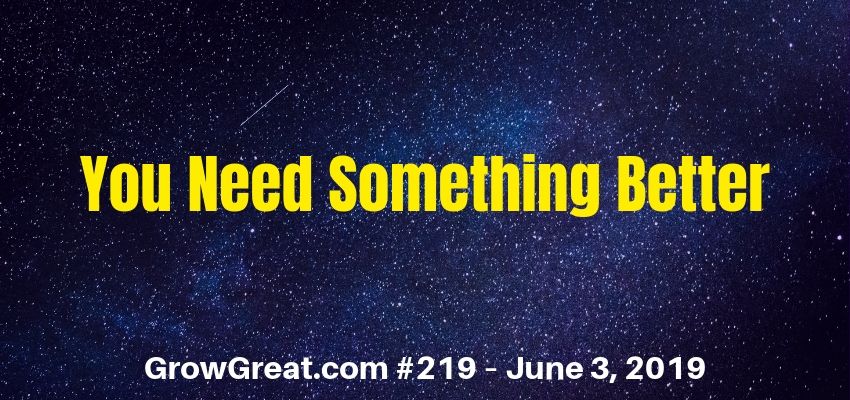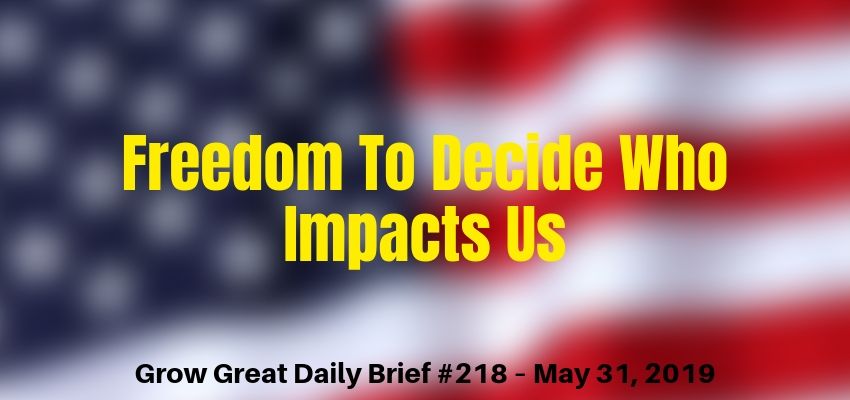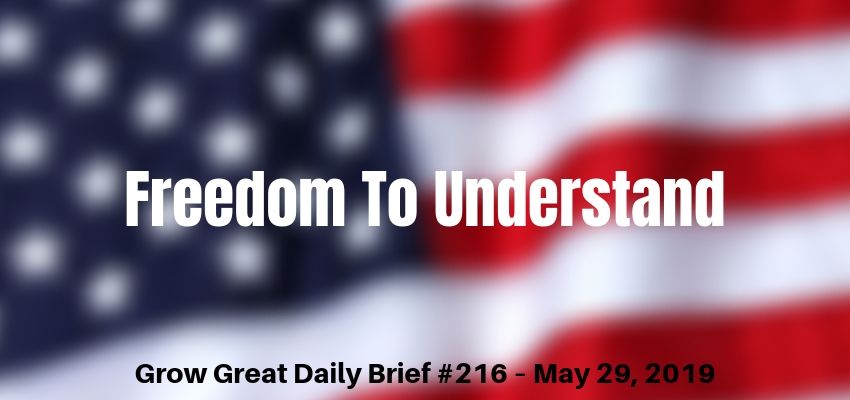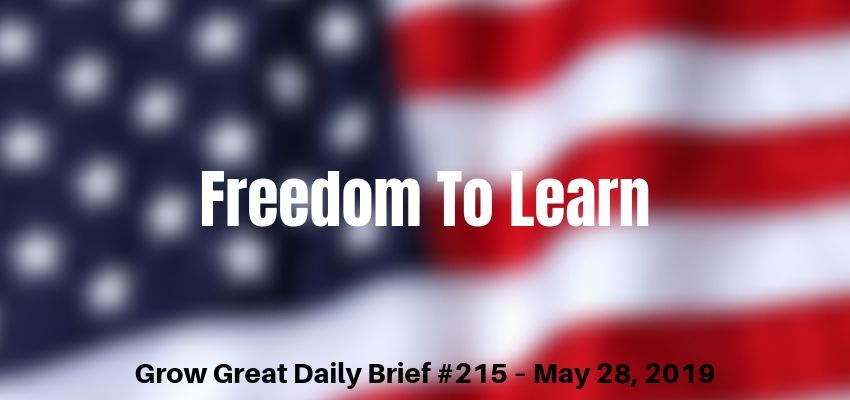Podcast: Play in new window | Download (Duration: 15:25 — 18.8MB)
Subscribe: Apple Podcasts | Spotify | | More
We’ll wrap up this week’s freedom theme with some thoughts about the freedom to decide the people who we’ll allow to impact our lives. It’s the idea Leo Bottary and I concentrate on in our podcast, WHAT ANYONE CAN DO.
Who you surround yourself with matters!
YourLifeCounts.org is the website for a suicide prevention organization. They’ve got a page about what some young people have said about their peer group – the impact of the people surrounding them.
Mike (aged 16) says:
“I smoked my first cigarette when I was 11. I didn’t want to but all my friends were smoking and I didn’t want to be out of the group. Once I’d started I couldn’t stop. I was addicted… I wish I hadn’t started. I knew it was wrong and I didn’t want to.”
Liz (aged 15) says:
“I went to a party with my friends from school. My mom always told me not to allow any guys to take advantage of me and to stick together with my friends when I’m at parties. All my friends said they wanted to have some fun with a guy and most of them said they had been with a guy. I had never been with a guy and didn’t want to. But at this party all my friends danced with guys and I went into the garden with a guy who said he wanted to go somewhere quiet. I don’t know why I did that. He raped me in the garden while everyone was having fun at the party. The music was so loud no one could hear me. The cops came and it was horrible. I don’t want anyone to go through what I went through.”
Ryan (aged 15) says:
“I like cars a lot. Me and my friends started stealing cars over a year ago. I didn’t want to do it but we all felt we could have some fun and get away with it… I’ve been caught twice by the cops and they say if I do this again I will go to jail. I don’t like what this has done to my mom and dad. They don’t want me to hang with these guys anymore but they’re my friends… I wouldn’t do this on my own but when I’m with the guys it makes me feel good and I can do stuff.”
Here’s the last statement on that page…
Remember that you are important. Your life counts, and you can make a difference in this world. If you ever need to talk about this or anything else, feel free to get in touch with us. We’re here for you.
I don’t have to convince you that mental health is supremely important. Your mental health.
Do I? Please don’t say you’re not convinced that your mental health is of paramount importance! Just do a Google search on it and you’ll find compelling evidence that would convince the biggest of skeptics. But just to make the point let me mention some numbers cited by the American Psychological Association.
As of January 2019 these are just suicide numbers. Depression, anxiety, chronic loneliness and a host of other issues can plague any of us.
30%
The increase in the rate of death by suicide in the United States between 2000 and 2016, from 10.4 to 13.5 per 100,000 people, according to a National Center for Health Statistics analysis of data from the National Vital Statistics System. The rate increased by about 1 percent per year from 2000 through 2006 and by about 2 percent per year from 2006 through 2016.
50%
The increase in suicides among girls and women between 2000 and 2016, from 4 to 6 per 100,000.
21%
The increase in suicides among boys and men between 2000 and 2016, from 17.7 to 21.4 per 100,000.
10
Suicide was the 10th-leading cause of death in the United States in 2016. It was the second-leading cause of death among people ages 10 to 34 and the fourth-leading cause among people ages 35 to 54.
As business owners, executives and leaders we know all too well how lonely it is professionally. Sometimes that professional loneliness is worn like some badge of courage because it’s how we think it’s supposed to be. And I get it.
We want to run our own show. That’s why we do what we do. Understood. But that doesn’t mean other people can’t provide value to help us.
We don’t want others making decisions for us. Again, it’s why we do what we do – and why we do it the way we do it. But that doesn’t mean we can’t lean on the perspective and wisdom from others to help us make better decisions.
Our lives are our habits. We’re in the habit of being alone. And in making others think we have all the answers, even when we don’t. Quite literally, we live by the moniker, “Never let ’em see you sweat.” We only want people to see our highlight moments. We hope they don’t see, or will quickly forget our low ones.
“If everything is important, then nothing is important.”
I was still a teenager when I first said it. I was about 25 when I made it part of my business philosophy.
It was born in my head as I watched a frantic business owner – the guy I worked for – anguish over every little detail. EVERY detail. He’d go off about the slightest thing. Meanwhile, I noticed things I felt were major – big constraints in our operation – would go totally unnoticed. It was that whole stepping over dollars to pick up pennies syndrome that I so frequently see among business owner control freaks.
After a few years of leading, I realized it had a deeper meaning. Business success demands consistently good decision-making. It’s problem-solving. With the intent of making the best decisions possible with the hopes of getting it more right than not. It’s priorities. Our ability to establish them for the organization and our ability to keep the company on track toward accomplishing specific objectives.
You need to look at your life as the resource – the asset – that it is. Every business owner and CEO has one fundamental job – to properly allocate resources where they can accomplish the most for the organization. You can’t support or fund everything. You know that. Except when you’re operating your life, you forget it. Or neglect it. Maybe intentionally (which is really stupid). Head in the sand syndrome and all that.
Sadly, among the first things to give is our mental welfare. We accept stress and all the rest of it with resignation that “this is just how it is.” But it’s not how it has to be. Because like those last lines of the YourLifeCounts.org website says, your life matters. I only take issue with their statement, “IF.” If you need to talk with someone, they’re ready. I appreciate it and my issue may be subtle but it’s enormous. People DO need to talk with somebody. The question is, “Who?”
Who will surround us?
For most of us, it’s purely organic. It’s our family, friends, professional acquaintances and social acquaintances. That’s it. It’s all these people who surround us because our kids play sports together and attend the same school. It’s all these people we go to church with. It’s all these people we encounter at work. It’s the people who sit near us at the stadium because we’re all season ticket holders. The bottom line is, it’s the people who surround us because something else – perhaps something very important to us – brought us in contact with one another.
It’s not that we went looking to join ourselves to these people because we knew they could help us elevate our lives.
It’s not that we intentionally figured out a group of people who shared our common goals and hurdles – other business people willing to let their hair down and share what they’d learned and what they were still working to figure out.
Why? Why not?
Because statistics prove that fewer than 2% of CEOs take advantage of such a thing. Crazy, whip-smart leaders capable of running businesses that generate the global economy can’t figure this out? What’s up with that?
I’ll keep preaching the truth of it. Courage!
Men and women courageous enough to make big bets on themselves and their ideas. And their companies. Men and women who have faced down world-class adversity to escape the gravitational pull of failure! But men and women who simply don’t stare down the barrel of one of their biggest challenges – WHO can help me go higher? What group of people can I surround myself with who get it? People who understand what my life looks like – what it feels like. Who?
The simple answer is people doing what you’re doing. People running companies. Business owners. People working diligently each month to make payroll, get the bugs out of that code, get those widgets off the assembly line, get those cars sold and delivered, get those custom houses built and sold, get that magazine published (and the advertising sold). All the stuff that we need to accomplish to make our operations successful – who can we surround ourselves with who gets it? All of it?
The answer isn’t singular.
I was born in a small Oklahoma town where the business leaders gathered in the morning at a local café for breakfast. They did more than mingle. They connected. They communicated. They collaborated. They networked. They became friends. That was also in a time and place where such things were commonplace around the world I suspect. Especially in smaller, more rural places where community may have been easier. Who can be sure?
The Ghostbuster’s movie question is worth asking, “Who you gonna call?”
When the chips are down and you’re struggling to figure it out – who you gonna call?
When the decision is big and looming even larger – who you gonna call?
When you feel like you need another pair of eyes to just take a look at it – who you gonna call?
When I was in junior high and high school I had a close group of friends. We were all good students and had many of the same classes together. Hours and hours were spent in free time sitting at large round tables in the library talking. Sharing experiences. Checking in with one another. It was like most of the groups I described earlier – organic. But it had a benefit we likely didn’t fully realize at the time. We were going together in this scholastic journey. And it was bigger than schoolwork. It was life stuff, too. We were free to decide we wanted to be there for each other. We cared about each other. And we trusted each other.
I’ve never experienced it since then. That was 45-50 years ago. And that makes me sad. Sad that during all these moments of our lives we’re making this much, much harder than it is. All because we don’t exercise the freedom to decide who will impact us.
That’s why my life’s work during this encore edition of my work is almost entirely focused on THE PEER ADVANTAGE by Bula Network. It’s an online group of just 7 small business owners who will get together – like me and my friends did around those round library tables – except we’ll get together using the Internet via a video conferencing platform. It’s a group with a single design – to provide freedom for every member to be intentional and purposeful about the people who can help them soar higher and more quickly overcome their challenges. Please go check it out at ThePeerAdvantage.com and hit that “apply now” button.
Be well. Do good. Grow great!
RC





